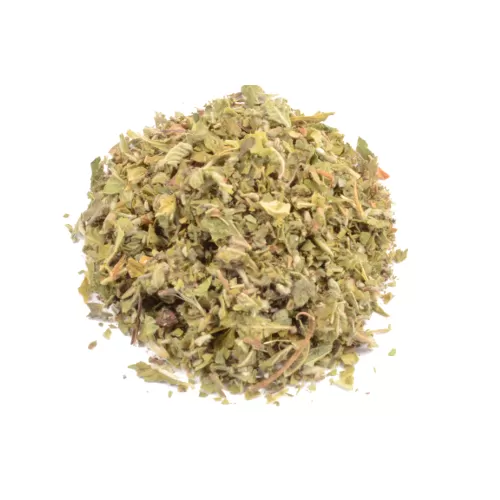
Incorporating herbs into your daily diet? Here's how to do it!
 Herbs have played a prominent role in the human experience since time immemorial, not only as food sources but also as means of supporting overall well-being. Before delving deeper into this topic, it is helpful to first define what we mean by "herbs." In this context, we refer to plants whose leaves, roots, flowers or seeds can be used for culinary, cosmetic and supportive health purposes.
Herbs have played a prominent role in the human experience since time immemorial, not only as food sources but also as means of supporting overall well-being. Before delving deeper into this topic, it is helpful to first define what we mean by "herbs." In this context, we refer to plants whose leaves, roots, flowers or seeds can be used for culinary, cosmetic and supportive health purposes.
The appeal of herbs lies not only in their rich aromas and flavors but also in their potential to improve quality of life. While it is important to emphasize that herbs are not a substitute for professional medical advice or treatment, many people have integrated them into their daily routines as a complement to a healthy lifestyle.
There are numerous cultures worldwide that have a rich history of using herbs to promote wellness. From tea drinking in Asia to the use of herbal oils in the Mediterranean, herbs are an important part of public health and well-being everywhere. They are accessible, versatile and come in a wide range of forms, including fresh, dried, and even as extracts, tinctures and supplements.
Today here at Avalon Magic Plants, we will explore different types of herbs, mainly categorized based on their effects on the human body such as energizing herbs, brain-boosting herbs and calming herbs. We will also discuss different ways these herbs can be taken and how buying herbs online can support your daily life.
With this knowledge, we can make a more conscious and informed choice about how to use herbs to support our overall quality of life. Let's take a look!
An herb for every purpose
Herbs can have a range of effects on our bodies and well-being. While some herbs can help you maintain your energy levels, others can contribute to mental clarity or relaxation. In this section, we will divide herbs into three main categories: energizing herbs, brain-boosting herbs and calming herbs. This classification is not a hard science, but rather a useful way to group herbs based on how people generally experience them.
Energy herbs
Life can be exhausting at times, and at those times we often look for natural ways to feel more energetic. Herbs such as ginseng and guarana are often associated with an increase in energy. These herbs are commonly used in tea blends, smoothies and even in some energy drinks. While they are no substitute for a good night's sleep or a balanced diet, some people use these herbs as a supplement to get through their day.
One of the fascinating aspects of herbs is their versatility and wide range of uses. Among energizing herbs, ginseng and guarana are perhaps the best known.
Ginseng is a root native to East Asia and North America. It is often used in tea form or as an addition to smoothies and juices. Many people report feeling more vital after consuming ginseng. It is also often found in energy bars or cereals as a way to give an extra boost.
Guarana is a climbing plant that grows primarily in the Amazon basin. The seeds of this plant contain caffeine and are often used in energy drinks or as a dietary supplement. As with all herbs, it is important to use guarana in moderation and pay attention to how your body reacts to it.
Brain-boosting herbs
Good mental health is just as important as physical health. Herbs such as rosemary and ginkgo biloba are often associated with improved concentration and mental clarity. For example, some people use rosemary oil while studying or working on an important project. It is interesting to note that many of these herbs are also commonly used in the culinary world, which shows how versatile they are.
When it comes to cognitive support, there are several herbs that are a popular choice.
Rosemary is not only a popular kitchen herb but is also valued for its aromatic oils. Some people use rosemary oil while meditating or studying, with the idea that it helps improve concentration.
Ginkgo biloba, one of the oldest known plant species, is often associated with mental clarity. It is usually sold in the form of tablets or capsules, and some believe ginkgo may have a beneficial effect on memory and concentration.
Relaxing herbs
In our hectic world, finding moments of rest and relaxation is crucial to well-being. Calming herbs such as lavender and chamomile have a reputation for helping to relax and unwind. They are popular in a range of products, from teas to essential oils, and are often used for moments of rest, such as before bed or during stressful situations.
For those moments when relaxation is the priority, calming herbs can be a welcome addition.
Damiana is perhaps best known for its calming properties. The herbs of the Turnera Diffusa plant are often used in tea blends and its essential oil is popular in aromatherapy.
Chamomile is another herb known for its calming effects. Chamomile tea is often drunk before bed or during moments of stress to promote a sense of calm.
It is important to emphasize that while herbs can play a complementary role in your overall well-being, they are not a substitute for medical advice or treatment. It is always a good idea to consult a health care provider before adding new herbs to your routine, especially if you are already taking medications.
Different methods of taking herbs
Once you have decided which herbs best suit your needs and lifestyle, the next step is to determine how best to consume them. There are several ways to take herbs, and each method has its own benefits. Below we discuss some of the most popular methods: teas, supplements and tinctures.
Tea
One of the simplest and most enjoyable ways to consume herbs is by making a cup of tea. From chamomile to ginseng, many herbs can be easily brewed to make an aromatic and flavorful beverage. Tea has the advantage that it can be both refreshing and relaxing, and you can experiment with different blends to find your perfect blend. In addition, tea is a great way to stay hydrated.
Supplements
For those looking for a more standardized and convenient way to consume herbs, supplements are an option. These usually come in the form of capsules or tablets and contain a fixed amount of the active ingredient. While supplements can be convenient, it is essential to choose carefully which ones you take. Always look for products that have been tested for quality and purity. And, as always, it's a good idea to consult a health care provider before adding a new supplement to your diet.
Tinctures
Tinctures are another versatile way to consume herbs. These liquid extracts can be made from a wide range of herbs and are usually very concentrated. They can be added to water, tea, or even food. Tinctures offer a quick and easy way to consume herbs and are especially convenient for people who are on the go a lot.
In all cases, it is crucial to pay attention to the recommended dosage and any contraindications. While herbs can have many positive effects, they can also interact with medications or cause side effects.
Practical tips for the safe and effective use of herbs
Now that you know more about the different types of herbs and the ways they can be taken, it's time to share some practical tips for using herbs safely and effectively in your daily life.
Choose quality
As with any other product, with herbs, what you get is what you pay for. Always go for high-quality products from reputable brands. Here at Avalon Magic Plants, we only offer products Read labels carefully and pay attention to things like the herb's origin, expiration date and any labels that guarantee quality.
Start with a small dose
If you are just beginning to use a new herb, it is wise to start with a small dose. This will allow you to better observe how your body reacts. Some people can be sensitive to certain herbs, so it's a good idea to be careful.
Consult a professional
Although herbs are natural, this does not mean they are always safe for everyone. If you are on medication or have a medical condition, it is crucial to consult with a health care provider before adding herbs to your regimen. This is especially important for people who are pregnant, nursing or have chronic health problems.
Vary and combine with care
While it can be fun to try and combine different herbs, it is important to do so in a thoughtful manner. Mixing multiple strong herbs can have unpredictable effects. If you are unsure how to safely combine different herbs, seek professional advice.
Be patient
Don't expect miracles right away. It may take a while before you begin to feel the effects of certain herbs. Every body is different, and what works for one person may not necessarily work for another.
By keeping these tips in mind, you can responsibly use herbs and herbal extracts as part of a healthy lifestyle. Remember that while herbs can contribute to your well-being, they are not a substitute for a balanced diet, regular exercise and professional medical advice.








